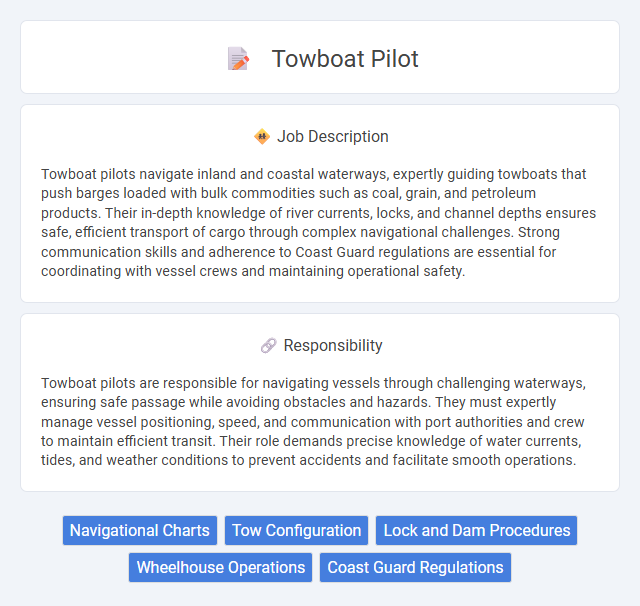
Towboat pilots navigate inland and coastal waterways, expertly guiding towboats that push barges loaded with bulk commodities such as coal, grain, and petroleum products. Their in-depth knowledge of river currents, locks, and channel depths ensures safe, efficient transport of cargo through complex navigational challenges. Strong communication skills and adherence to Coast Guard regulations are essential for coordinating with vessel crews and maintaining operational safety.
Individuals who are physically fit and possess strong decision-making skills are likely to be well-suited for a towboat pilot job, as the role demands navigating challenging waterways and handling heavy equipment. Those with high stress tolerance and good spatial awareness might find themselves better equipped to manage the unpredictable conditions often encountered during towing operations. Conversely, people who struggle with physical endurance or decision-making under pressure may find this occupation less compatible with their abilities.
Qualification
Towboat pilots must possess a valid pilot's license issued by the U.S. Coast Guard, demonstrating comprehensive knowledge of navigation, vessel handling, and maritime safety regulations. Extensive experience in operating tugboats or similar vessels on inland waterways is essential, often requiring several years of on-the-job training or apprenticeship under licensed pilots. Strong decision-making skills and familiarity with local waterways' tides, currents, and weather conditions are critical qualifications for ensuring safe and efficient towboat operations.
Responsibility
Towboat pilots are responsible for navigating vessels through challenging waterways, ensuring safe passage while avoiding obstacles and hazards. They must expertly manage vessel positioning, speed, and communication with port authorities and crew to maintain efficient transit. Their role demands precise knowledge of water currents, tides, and weather conditions to prevent accidents and facilitate smooth operations.
Benefit
Towboat pilot jobs likely offer competitive salaries and comprehensive benefits, including health insurance and retirement plans, making them financially attractive. The role probably provides opportunities for steady employment given the consistent demand for skilled pilots in inland waterways. Job stability and potential for overtime pay may further enhance overall compensation and career satisfaction.
Challenge
Towboat pilot positions likely present significant challenges due to navigating large vessels through congested waterways and varying weather conditions. The complexity of coordinating with other maritime traffic and ensuring the safety of cargo and crew may add to the demanding nature of the job. This role probably requires strong decision-making skills and the ability to remain calm under pressure.
Career Advancement
Towboat pilots navigate vessels through challenging waterways, requiring specialized certifications such as a Master's license under the U.S. Coast Guard. Career advancement often involves gaining experience in larger vessels or hazardous routes, along with continuous training in maritime safety and navigation technology. Progression can lead to roles like harbor pilot, fleet manager, or maritime operations director, offering increased responsibility and higher earning potential.
Key Terms
Navigational Charts
Towboat pilots rely heavily on accurate navigational charts to safely maneuver vessels through complex waterways, ensuring efficient route planning and hazard avoidance. These charts provide critical information such as water depths, currents, obstructions, and port layouts essential for precision steering and docking. Mastery of electronic and paper chart systems enables towboat pilots to maintain situational awareness and respond effectively to dynamic environmental conditions.
Tow Configuration
Towboat pilots expertly manage tow configurations to ensure safe and efficient navigation on rivers and waterways. They adjust the arrangement, size, and number of barges connected, optimizing maneuverability and stability while considering water current and weather conditions. Precise tow configuration is critical to preventing accidents, maintaining cargo integrity, and meeting regulatory requirements.
Lock and Dam Procedures
Towboat pilots navigate vessels through complex lock and dam systems by precisely coordinating lock entries, water level adjustments, and vessel positioning to ensure safe passage. Mastery of lock signaling protocols, understanding hydraulic flow controls, and communication with lock operators are critical for efficient transit. Expertise in maneuvering large tows within confined lock chambers minimizes delays and prevents damage to infrastructure and cargo.
Wheelhouse Operations
Towboat pilots specialize in Wheelhouse Operations, expertly navigating inland waterways and managing vessel controls for safe and efficient transport. They monitor navigational instruments, communicate with crew and port authorities, and adjust steering and throttle to maintain optimal vessel positioning. Proficiency in radar, GPS systems, and compliance with maritime safety regulations are essential for successful wheelhouse management.
Coast Guard Regulations
Towboat pilots must strictly comply with U.S. Coast Guard regulations to ensure safe navigation and vessel operation on inland waterways and coastal areas. These regulations include mandatory licensing, strict adherence to vessel operation standards, and compliance with environmental and safety protocols to prevent accidents and pollution. Regular training and certification renewals are required to maintain proficiency and legal standing under Coast Guard oversight.
 kuljobs.com
kuljobs.com